|
|
|
Sort Order |
|
|
|
Items / Page
|
|
|
|
|
|
|
| Srl | Item |
| 1 |
ID:
091712
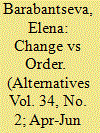

|
|
|
|
|
| Publication |
2009.
|
| Summary/Abstract |
This article examines how China, understood as a construct made up of multiple identities, constantly negotiates its relationships with the world. The oppositions-between tradition and modernity, the past and the present, China and the West-that are often presumed or reproduced in our thinking about China's place in the world are called into question. China's relationship with the world must be understood through the interplay between history and present, and thus through the particular uses of history in practice. The article especially explores how the world and China's place in it are seen in Chinese popular culture and visual expressions of state initiatives to promote Chinese culture. It focuses on the way images of the ever-changing world are depicted in two visual narratives: a promotional video of the Confucius Institute and the film The World (Shijie)
|
|
|
|
|
|
|
|
|
|
|
|
|
|
|
|
| 2 |
ID:
082731
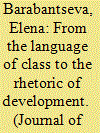

|
|
|
|
|
| Publication |
2008.
|
| Summary/Abstract |
In the People's Republic of China's (PRC) continuous state-building project since its establishment in 1949, the notion of nation and nationality (minzu) has been uninterruptedly utilised by the leading elite in its political programmes. The notion of the 'nationality question' (minzu wenti) was employed especially for addressing the issues of the officially identified minority nationalities at the time when the multinational nature of the state was made fundamental. However, how a multinational character of the Chinese state is interpreted by the state elite and how this interpretation is shaped by their policies have arguably changed along with the political and economic preferences of the regime. This paper aims to explore the meaning of 'nationality question' during the period of socialist construction, and traces the shift in its notion during the reform period which started in the 1970s. The essay pays attention to the change in the preferred corresponding English term of minzu wenti. I argue that the substitution of the 'nationality question' term, which was dominant during the socialist period, with the concept of the 'ethnic question' during the reform period points not only to the changing character of the government policies towards minorities, but also legitimises them as the only suitable and rightful in the context of economic reforms.
|
|
|
|
|
|
|
|
|
|
|
|
|
|
|
|
| 3 |
ID:
114668
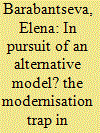

|
|
|
|
|
| Publication |
2012.
|
| Summary/Abstract |
This article contributes to the debates on China's socio-political transformations by tracing the link between China's modernization and nationalism, and
analysing their mutual interplay. Many recent studies discuss post-Mao China's
development as a unique model challenging earlier development approaches. Instead,
the argument pursued here points to the dependence of China's dominant development
thinking on the paradigm of modernization and its symbolic celebration in official
discourse and public rituals. By tracing the impact of the modernization paradigm in
the influential annual publication China Modernization Report and in the 2009
National Day mass parade, the article shows how and what kind of Chinese nation is
produced. I argue that China's ostensibly unique development model is constrained by
the modernization thinking underlying it. Analysis of the discourses on modernity and
'scientific development' and the symbolism associated with them reveals a series of
dichotomies and oppositions underpinning China's nation-building. China's pursuit of
modernization relies on the suppression of other possible development paths within
China and subsumes Chinese development experiences under those of the generalised
West, thereby restricting development alternatives to those allowed within a
hierarchical view of the world.
|
|
|
|
|
|
|
|
|
|
|
|
|
|
|
|
| 4 |
ID:
177715
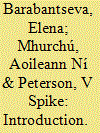

|
|
|
|
|
| Summary/Abstract |
In this introduction to the special section on “Engaging Geopolitics through the Lens of the Intimate”, we first locate the papers collected here in the context of developing an “Intimate Geopolitics” project at the University of Manchester. We then review the importance of ‘intimacy’ and the concept of ‘the intimate’ across an array of disciplinary studies, drawing especially on the rich body of work by critical geopolitics scholars who have long challenged categorical binaries and territorial boundaries. Our focus here is exploring what insights we can bring to understanding the nexus of intimacy and global politics by deploying the lens of the intimate--understood as a variety of processes of attachment and relationality--in six globally dispersed case studies. Collectively, the papers presented here not only engage a wide range of issues and locations, but also contribute to research engaging geographically specific contexts and practices. We note that the papers ‘cluster’ around issues of migration, borders, ‘home’, asylum and visa regimes, prompting us to suggest that the papers productively inform three foci of inquiry. Specifically, the papers 1) enrich our understanding of bordercrossing beyond simple association of this with the movement of people, things and ideas; 2) deepen our understanding of how geopolitics is constituted by forms of attachments and relationality that are integral to forms of governance; and 3) help us explore how attachments are not simply additive but productive of geopolitical concerns.
|
|
|
|
|
|
|
|
|
|
|
|
|
|
|
|
| 5 |
ID:
177720
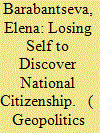

|
|
|
|
|
| Summary/Abstract |
Drawing on the life stories of post-Soviet women from Ukraine and Russia who married Chinese citizens and moved their married lives to China, this article examines how these women engage in intimate geopolitics in the adverse immigration environment for foreign family members. The elaborated argument maintains that the women – driven by the uncertainty surrounding their legal and socio-economic status and the fear of forced separation from their children – resort to their home citizenship or informal dual citizenship arrangements as leverage to defend parental rights against the backdrop of China’s strict single citizenship regime. The women develop strategies to ensure their parental rights through citizenship structures available to them, and seek to remedy their emotional uncertainties amid the environment of limited and tenuous immigrant and family statuses in China. This paper develops analytical potential of intimate geopolitics through an analysis of post-Soviet wives’ subjectivities constituted through the interplay of geopolitical structures and their emotional intensities.
|
|
|
|
|
|
|
|
|
|
|
|
|
|
|
|
| 6 |
ID:
107678
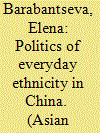

|
|
|
| 7 |
ID:
143645
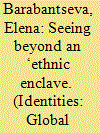

|
|
|
|
|
| Summary/Abstract |
Research on Chinatowns stresses the spatial aspects of their production as communal urban spaces. This is particularly evident in the prevailing rhetoric of ethnic ‘enclaves’ that is common in the literature on Chinatowns. This article stresses the importance of taking into account the temporal dimensions of the examinations of space and migrants’ relationships with the city. The argument maintains that, although Manchester Chinatown incorporates many layers of time, only some of them are acknowledged. This view ties both space and people into a particular temporality that is associated with a predetermined culture and tradition. The article shows how relocation from Chinatown to a non-ethnically defined urban area makes it possible for community organisations to depart from the essentialised ethnic, cultural, and social associations produced through dominant understandings of migrant communal space.
|
|
|
|
|
|
|
|
|
|
|
|
|
|
|
|
| 8 |
ID:
146136
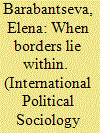

|
|
|
|
|
| Summary/Abstract |
This article examines the changing geopolitical realities which have redefined the nature of sovereign governance on the Sino-Vietnamese border. The binary forms of classification in a rigidly and clearly delimited Sino-Vietnamese borderland replace the ambiguous space of “zomia,” with its fluid and overlapping identifications. This dynamic context sets the conditions for local communities and their long-standing tradition of ethnic marriages straddling the borders of China and its neighboring states. In order to understand how, and why, the status of previously accepted forms of undocumented ethnic marriage has recently changed from “common” (shishi) to “illegal” (feifa) in two ethnic Yao villages, I look at various factors. These include how state discourses on marriage migration in Asia, biopolitical concerns about population security in China, and regional iterations of the global anti-human trafficking campaign, come into play in forceful ways to shape the geopolitical regime of the Sino-Vietnamese borderland and redefine the terms of legitimate practices, thus reconfiguring ethnic marriages as illegal.
|
|
|
|
|
|
|
|
|
|
|
|
|
|
|
|
|
|
|
|
|